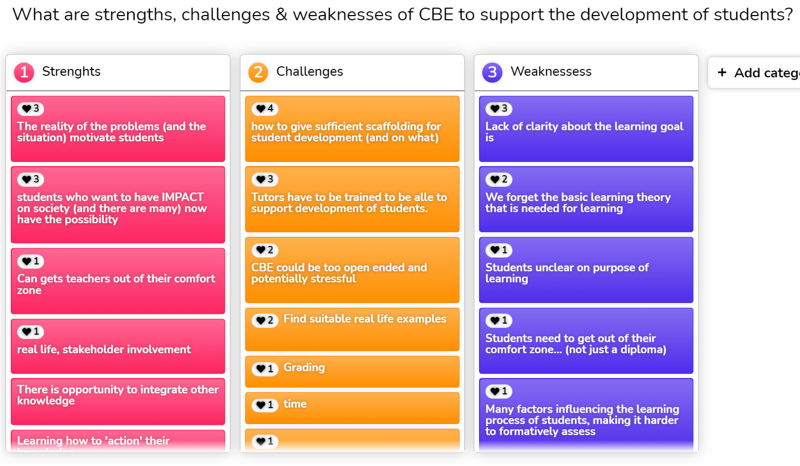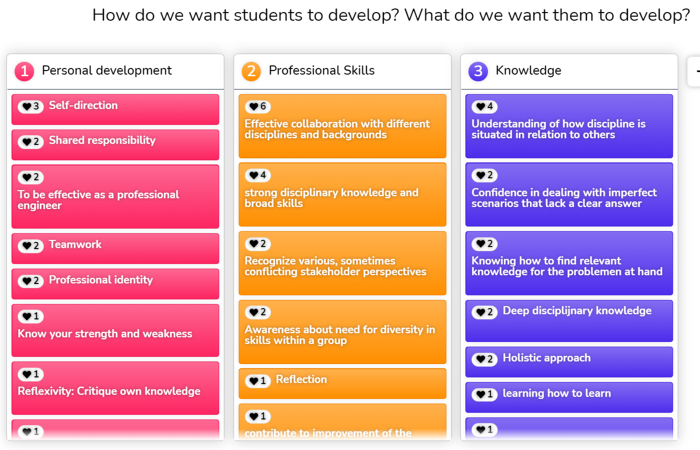Blog by 4TU.CEE coordinators Chris Rouwenhorst (UT) & Renate Klaassen (TUD)
In this third webinar in the series, on the 8th of March, Dr Remon Rooij welcomed around 50 participants to discuss student development in challenge-based learning. Three studies into student learning were presented. They gave rise to a vivid discussion with the audience and presenters, moderated by Chris and Renate. The session helped in gaining a better insight into the development of students in the Challenge-based learning environment.
Caroline Wehrmann and Casper Smits (TU Delft)
Research Transdisciplinary Learning; Designing a toolbox for lecturers to facilitate transdisciplinary learning in engineering education.
Caroline Wehrman and Casper Smits explained how students can deal with uncertainties in a challenge-based course called C-Lab. In this challenge, students encounter different types of uncertainty: (1) task uncertainty, (2) social uncertainty and (3) individual uncertainty. In principle, the uncertainties are learning opportunities. However, coping with uncertainty needs critical reflection, as too much uncertainty can lead to a learning barrier. A prototype or model was developed to deal with uncertainty. This tool can help students handle the different types of uncertainty. The prototype is based on a "perspective pyramid" where a situation leads to action, based on the model of Schon's reflection in action. The tool uses "reflection in action" on how students perceive uncertainty, the cause of uncertainty and how to deal with uncertainty.

Preliminary results show that students are supported and guided in critical reflection to 'internalise' the uncertainty. An increase in student development has been registered.
Birgit Pepin, Ayse Kilic, Zeger-jan Kock, and Ulises Salinas Hernandez (TU/e)
Researching the learning experiences of applied mathematics students in a Challenge-based experience
In the second presentation, Birgit explained that the most important thing when designing courses, is to look at it from a student's point of view. She explained that a lens of 'resources' is used (ranging from textbooks to cognitive methods) at TU/e. How do students use these resources? Which ones are they using? In a previous study students were interviewed, and as a result, student study paths were identified. Ayse continued with guidance and student perceptions in a CBE - Mathematical Modelling course. The research showed problems with (1) different kinds of support and (2) student perceptions of their learning. In the next step, interviews will be analysed to incorporate the importance of the alignment of the product owner and supervisor.
Gunter Bombaerts and Diana Martin (TU/e)
Challenge-based learning ethics courses
The third presentation by Gunter and Diana showed an exploratory research agenda in the ethics courses. An introductory course in ethics is used with around 2000 participating students. In 2019 CBL was used for the first 180 students with positive results (higher intrinsic motivation, autonomy and competence) than the other control group. Some issues remain, such as the role of the teacher. The teacher role changes more to that of a coach, and situations with students might become very personal. These issues are structured through van den Akkers spiderweb.
Supporting personal development
After the presentations we talked about the personal development of students and how far one should go to support this development as a teacher. The following two chats going on in parallel summarise the debate's heat and relevance.
"Where to stop with personal questions is indeed difficult, as we indicated. There is no final answer to that. Some things: (1) It certainly has to do with what the learning goals are: How fundamental should questions be? It links to the pyramid discussed by Casper: how "deep" do you want to go? (2) It also has to do with "feeling" how far you can/should go. Although "subjective", this can be an indication. (3) Overall, going a bit "deeper" is very useful/important for personal development, because you hit very important things that will remain very important personal challenges/situations during their entire lives..."
Some learning goals might require a stronger normative position (agency related goals that ask students to take a stance in regards to what is "just" or "fair" imply a normative stance as to what just or fair refers to). In contrast, other goals would put the normative more in the background. They are oriented towards allowing students to find their (ethical) voice and articulate their opinions.
Additionally, we used a voting tool to interact with the audience during the plenary discussion and spark the debate even more. The first question we discussed was about the strengths, challenges & weaknesses of CBL to support student development.
The outcome of this question can be found here:

The second question that was discussed was how we want the students to develop personal development, professional skills & knowledge.
The result of this second question can be found here:

More information
Want to know more? You can find the full video of the webinar's presentation on student learning here. Join us for the next webinar on CBE: Assessment on the 21 April at WUR!
About the webinar series
4TU.CEE continues the webinar series on challenge-based education at the 4TUs. The new series will discuss research into CBE/CBL practices and will focus on students, lecturers and stakeholders. What can these groups learn when participating in CBE/CBL trajectories?



